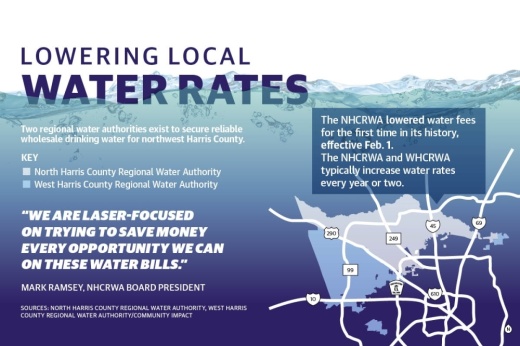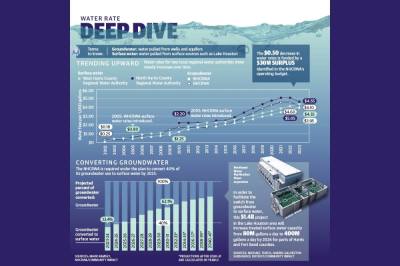The North Harris County Regional Water Authority has seen a change in leadership and lowering of water rates since last fall—two historic moves for the authority.
In late 2022, candidates Mark Ramsey, David Barker and Melissa Rowell unseated three long-term incumbents during the Nov. 8 election. In early 2023, the new board then voted to lower water rates for the first time in the authority’s 22-year history. The rate decrease went into effect Feb. 1.
Ramsey, the president of the board, said the board members who ran against incumbents in November campaigned to hold water rates constant, but after finding a $30 million surplus in the operating budget later in January, the board decided to reduce the rates by an amount it believes is sustainable.
Both surface water and groundwater rates were reduced by $0.50 per 1,000 gallons. Surface water rates dropped from $5.05 to $4.55, and the groundwater pumpage fee went from $4.60 to $4.10 per 1,000 gallons.
“The reserves that were in several different accounts were far higher than what was a reasonable level,” Ramsey said. “We certainly don’t want to run out of money, and we don’t want to go bankrupt, but neither do we need hundreds of millions of dollars in the bank. So, these rate cuts, in part, are funded by the rates being too high in the past.”
Ramsey said lowering the rates caused a $25 million loss in revenue. However, the reserve budget is still more than $300 million, he said.
Historical rates
Before 2023, data from the NHCRWA shows water rates steadily increasing every two years with the last raise in April 2021. Kelly Fessler, one of two remaining incumbents following November’s election, said the former board was not planning on raising rates this year.
“I believe the former board was on the right track to achieve our mandated surface water conversion, and, if they had received the same guidance, it may or may not have reduced the rate,” he said.
The guidance for the rate change came from John Howell, one of the water authority’s investment consultants, Fessler said. Upon hearing the water rate could be lowered without affecting the bond rate, he said he voted in favor of the cut.
The West Harris County Regional Water Authority, which covers parts of Cy-Fair south of Hwy. 290, also uses an independent third-party rate analyst to recommend water rates.
Water rates in the WHCRWA have generally been the same or lower than NHCRWA’s, but it has never lowered water rates year over year.
“The WHCRWA board of directors continues their commitment to keeping the cost of water as low as possible and to keeping the periodic rate increases reasonable and consistent with that commitment,” officials said in an email.Ongoing projects
Ramsey said he anticipates no projects or services will be challenged by the loss in revenue. All water infrastructure projects are funded through the capital budget, which is not affected by the rate cuts, he said.
However, he said he will look for additional revenue streams including the use of federal and state infrastructure funds to use for large water infrastructure projects such as the Northeast Water Purification Plant expansion in Humble.
The plant, according to the project’s website, treats Lake Houston water and turns it into drinking water for parts of Harris and Fort Bend counties.
Michael Turco, general manager of the Harris-Galveston Subsidence District—the special purpose district working with surface water suppliers such as the NHCRWA—said it is the largest water project under construction in the U.S. The $1.4 billion project is scheduled for completion in 2024.
Turco said the region’s primary water source, historically, has been from groundwater pumped out of the Gulf Coast Aquifer System. However, to avoid subsidence, or the sinking of the surface, the subsidence district developed a plan to reduce groundwater withdrawal.
“There are large amounts of water in our aquifer system; however, if we rely on pumping groundwater as our main water supply, there are serious consequences,” Turco said.
The NHCRWA and WHCRWA are required under the plan to reduce groundwater usage to no more than 40% by 2025. Both water authorities confirmed they are on track to meet these goals.
Neighborhood-level impacts
Lori Adam, a board member for the Longwood Village homeowner’s association, said water authority fees have more than doubled in the past decade. The neighborhood is located near Grant and Louetta roads.
“We see it all the time on Facebook, especially when you get someone new that moves into the neighborhood and they get a water bill. They’re like, ‘What is this NHCRWA fee?’” Adam said. “It’s also a challenge [because] we have a fair amount ... of fixed-income residents, and I don’t know how they do it.”
The HOA maintains two pools and common area irrigation. Adam said the board is trying to mitigate rising fees by tracking water use in common areas and incorporating more drought-resistant plants and rocks in landscaping to minimize water use.
Ramsey said the existing water authority board does not intend to raise rates during the ongoing terms.
“We are laser-focused on trying to save money every opportunity we can on these water bills. ... Right now, we’re turning over every rock we can, and we’ve found that there are some things that don’t have to be done the way they’ve always been done,” he said.







